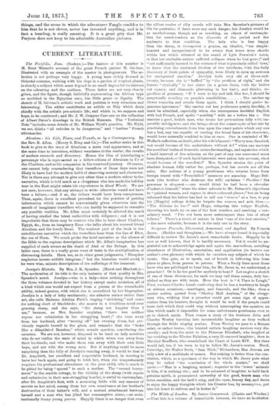Jocelyn's Mistake. By Mrs. J. K. Spender. (Hurst and Blackett.)—
The moderation of its title is the only instance of that quality in Mrs. Spender's novel. Jocelyn—who is a lady—does nothing throughout the three volumes devoted to her history except make mistakes, all of a kind which one would not expect from a person of the remarkable ability, indeed genius, with which she is accredited by her biographer. -Jocelyn is a lady of lofty sentiments ; she admires nature rather than art, she calls Madame Adelina Patti's singing shrieking," and cares for nothing short of blackbirds ; she muses in a troublous mood over grazing sheep, and she says, tbo sheep are happier than I run," because, as Mrs. Spender explains, "there was neither repose nor submission in her struggling heart ;" she runs away from her husband, after "tearing off" her evening dress, but pre- viously regards herself in the glass, and remarks that she "looks like a dilapidated Banshee," which sounds sportive, considering the occasion. We are not, however, disposed to be hard on lady novelists who do not realise the state of mind in which wives run away from their husbands, and who make them run away with their own little boys, and not with the wrong men. But if anything could be more surprising than the folly of Jocelyn's running away, it would be that of Dr. Amphlett, her excellent and respectable husband, in wanting to have her back again, and going to fetch her, when she tempestuously requires his professional attendance on the poor child, who ía much to be pitied for being " spared " to such a mother. The "second honey- moon" in the seaside cottage, in the vicinity of the sheep (with repose and submission in their non-struggling hearts), is awful to contemplate, after Dr. Ampblett's first, with a mourning bride with any amount of secrets on her mind, among them her own connivance at her brother's destruction of their father's will, and a mutual attachment between herself and a man who has jilted her consumptive sister,—an unin- tentionally fenny young person. Happily there is no danger that even the silliest reader of silly novels will take Mrs. Spender's pictures of life for portraits; if there were any such danger, her Jocelyn would be as unwholesome, though not so revolting, an object of oontompla- tion for novel-readers as the diem-cares of the period and the aspirants to that condition. The lady who is less happy than the sheep, is incomprise; a genius, an idealist, "too simple- hearted and inexperienced to be aware that there were chords within her which vibrated at the sound of Lyle Fenwick's voice, or that her excitable nature suffered collapse when he had gone ;" and
not sufficiently learned in the science of what is popularly called love,' to know that the continual friction of two intellects, with the daily discovery of fresh points of sympathy, wore likely to open up avenues for unexpected emotion." Jocelyn feels very old at three-and- twenty, because she is " baffled " by "the problem of right," and she listens "cynically" to her sister (in a green dress, with the bodice cut square, and ditunonds glistening in her hair), and thinks, re- gardless of grammar, "If I were to try and talk like her, I should be
perpetually treading on people's sensibilities. She catches up clever remarks, and retails them again. I think I should prefer in- genuous ignorance." She carries out her preference pretty forcibly, it must be admitted, especially when she intersperses doubtful English with bad French, and spells "acerbity" with an a before the r. She marries a good, foolish man, who treats her pretentious folly with im- possible indulgence ; and she brings about the catastrophe of her fate by practising concealments from him upon the exact points which any one but a fool, any one capable of reading the broad lines of his character, would have naturally confided to him at once. One is reminded of Mr Vireller's reflection on death, after his wife's funeral : "Worry true, Samivel, wet would become of the undertakers without it?" when one surveys the novelists' realm of domestic misunderstandings, and mysteries which a lucid interval of five minutes on the part of any one concerned must have dissipated,--' if such lucid intervals were taken into account, what would become of the novelists ?' Mrs. Spender strains the point of absolute human folly rather far, perhaps, but her novels are all the safer. Her notions of a young gentleman who returns home from foreign travel with " Frenchified " manners are amusing. Hugo Del- mott (the brother who destroys the will) exclaims " Pardien ! the governor is eloquent—one would think he had been a chevalier d'industr e himself," when his sister adverts to Mr. Dolmott's objections to "painted women, and rogues in straw-coloured gloves ;" but on being informed that his father has had to sell out " shares " at a loss, to pay his [Hugo's] college debts, he forgets the veneer, and acts thus :— "The dickens he has !" said Hugo, relapsing into vulgar English, throwing his heels up on one of the best couches, and smoking a con- solatory weed. I've not been more extravagant than lots of other fellows." There's a touch of nature in that "one of the best couches," —the more valuable, because it is tho only one in the story.


































 Previous page
Previous page